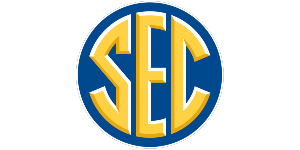Camden Murphy Adjusting to COVID Protocols to Lead Georgia in Season Like No Other
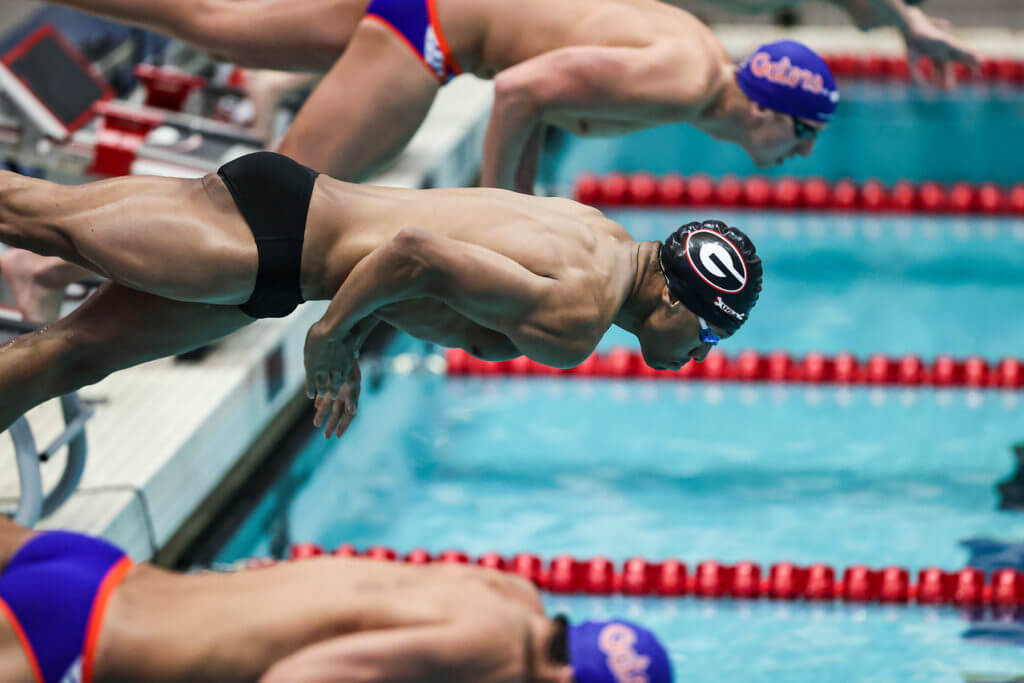
The Georgia Bulldogs are ranked #3 in the CSCAA Poll, and Camden Murphy is a big reason why the team has swum so well in a season that is anything but ordinary.
Even with so much uncertainty surrounding the fate of the NCAA swimming and diving season, some college teams have been able to hold dual meets with strict COVID-19 protocols in place to limit the spread of the deadly disease that has caused much of the sporting world to be turned upside down in 2020.
The University of Georgia has swum in three dual meets this season, against conference opponents South Carolina, Auburn and Florida, and hosted the Georgia Invite with nearby foes Georgia Tech and Florida State. With a big home win over eight-time defending conference champ Florida earlier in the season, the Bulldogs are ranked third in the latest dual meet poll behind Texas and Cal, while the women’s team has moved to national rank number one.
Senior Camden Murphy, currently the number one ranked swimmer in the NCAA in the 100 butterfly, has been able to swim selflessly this season in his final year in the sport for the Bulldogs, that has helped contribute to the overall success of the team halfway through the season.
“It’s been really hard to stay motivated especially in August because there was so much uncertainty,” Camden Murphy told Swimming World. “We are starting to get to that point again where it is starting to be uncertain again because I know a lot of teams are starting to get affected by COVID.
“I’m not swimming for myself but for other people and trying to be a role model for the people in the classes below me. I am trying to keep everyone happy and train the best that I can and try to help everyone the best that they can. If we do get to the end of the season, I think we will have a really good meet.”
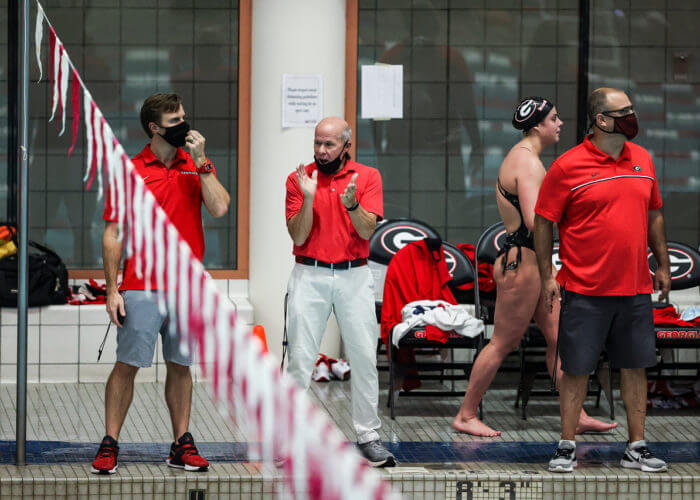
Coaches Neil Versfeld, Jack Bauerle, and Brian Smith donning masks at a Georgia dual meet. Photo Courtesy: Tony Walsh / Georgia Athletics
The COVID-19 pandemic has presented a number of challenges to the swim season — most notably Georgia has only swum in three dual meets total this semester and two of those were held without spectators with men and women competing in separate sessions. Masks are required by swimmers and coaches when not in the water, and there is hardly any interaction with the opposing team on the opposite side of the pool.
Even after a few months of living in a global pandemic, the protocols that come with holding a swim meet safely are still not quite normal to someone like Murphy.
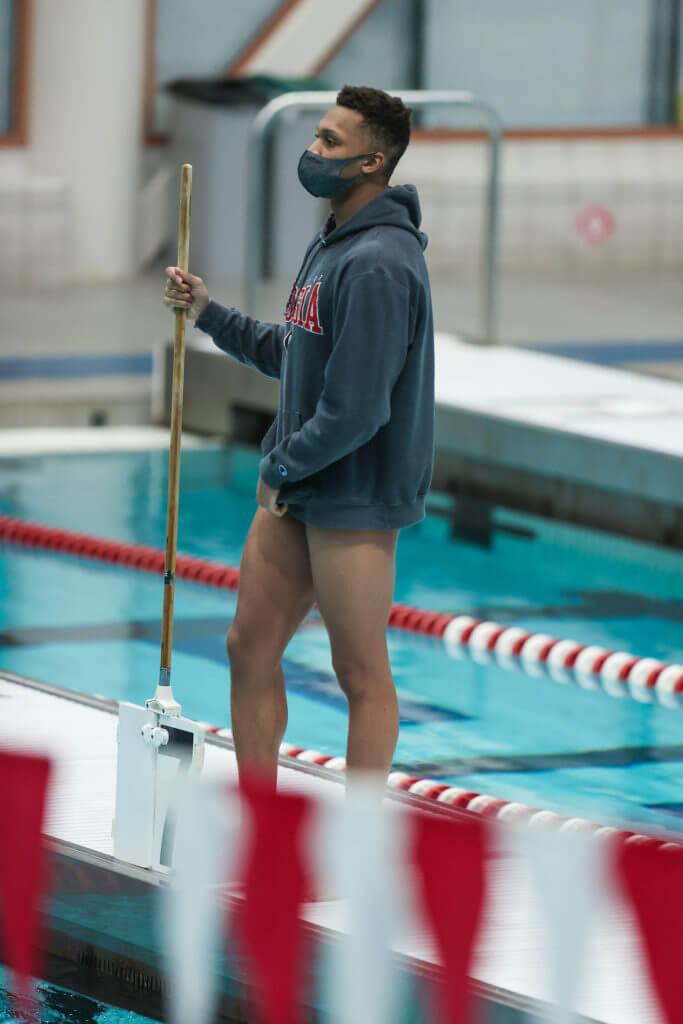
Camden Murphy counting at the Georgia Invite. Photo Courtesy: Chamberlain Smith / Georgia Athletics
“It is hard to adjust to,” Murphy said of the COVID protocols. “On buses we have to wear masks. We only traveled to one meet so that’s not really a problem for us but while we are on deck we have to wear masks. We aren’t allowed to line up behind the blocks like we usually are. We have to stand to the side and we have to wear a mask but behind the blocks we don’t have to wear one. But on deck just standing around, we have to wear a mask. It is pretty hard to remember because you’re warming up and down a lot and it is hard to keep track of when you are supposed to be wearing one and where your mask is. It might be wet because it falls in the pool — that is kind of gross, that has happened to me a few times.”
Having just a men’s only dual meet can speed up the timeline, and for Murphy it has been another adjustment to be made during a season like no other.
“I warm up and down a lot so I’m basically never leaving the warm down pool in between races because I’m always in there and there’s not enough time to get out and dry off and relax. If I’m not swimming, I’m sitting in there and watching the meet. I think the meet going by really fast and having to watch the women right before us is a lot different. It’s pretty motivating because watching the women swim really fast and knowing we are about to go gets us pumped up.”
But with a lot of changes made to the NCAA season, the actual swimming and racing aspect is unchanged. Murphy has been able to swim his lifetime best in the 100 fly this season (44.89) and swam an in-season best in the 200 fly against Florida (1:44.59). Before this season, he had never broken 47 in a dual meet in the 100 fly, and he swam a 46.82 against South Carolina in mid-October.
Not bad considering he had spent the majority of the summer away from the water during the COVID-19 lockdown. So how has he been able to swim faster than ever before?
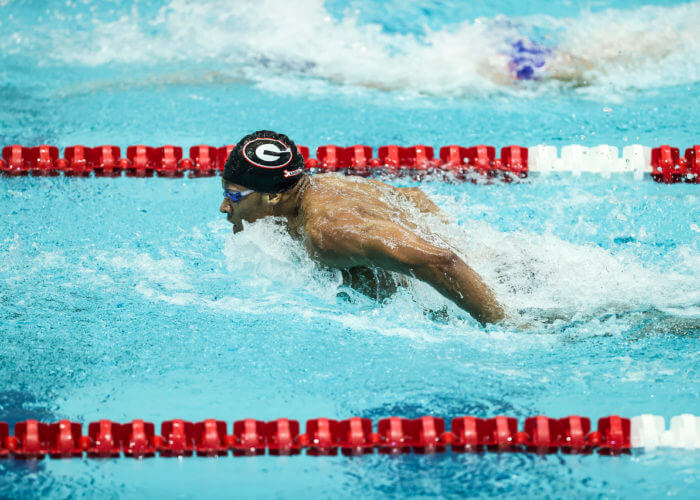
Camden Murphy racing Florida. Photo Courtesy: Tony Walsh / Georgia Athletics
“Honestly I don’t know why,” Camden Murphy said with a laugh. “I didn’t swim that much this summer. I thought I was going to come in a lot more out of shape than I was but I have been swimming a lot faster than I have been. It feels really nice. I’m much happier racing now.”
Last year a sprained ankle in early October caused him to not be able to kick for a few weeks, deterring his training and hindering his entire season. He saw virtually no rest at SEC’s in hopes of keeping his base up in preparation for a full taper at NCAAs, but the cancellation of the championships gave him yet another setback. But with an extended break away from the pool during the lockdown, it has given him a fresh approach to the sport in his final year.
In his senior year, Murphy has played a big role in Georgia’s defeat of SEC rival Florida for the first time since the fall of 2016. The Bulldogs have been boosted by a strong freshman class, which includes national champion Luca Urlando, who is third nationally in the 100 & 200 fly, and national high school record holder Jake Magahey, who leads the nation in the 1650.
Normally, college swim teams spend the months of August and September at tailgates, football games, and other social events to bond as a team and get to know each other ahead of the season. But with the COVID-19 pandemic still affecting day to day life in the United States, these mass gatherings have had to take a back seat to stopping the spread.
“In the beginning it was really difficult for the entire team to connect with each other since we weren’t allowed to all swim together and weren’t allowed to all be in the same place together. Luckily there’s only 3 guys in the freshman class (as of right now) so it wasn’t too hard to get to know them, but we had two training groups a day, and would swim with different people each day.
“These smaller training groups allowed us to train with teammates we usually don’t swim with – I would train with Andrew Abruzzo in the mornings even though he is a distance swimmer and does distance group and I’m a sprinter that usually does sprint group. We would also go out to eat at restaurants we knew were not crowded, and had safe COVID restrictions.
“I think now that we started to swim together we have started to get a lot closer, and especially with these last three meets it has helped with the bonding.”
And of course swimming fast in the season opener at South Carolina helped spark some confidence in the Georgia team.
“We swam pretty fast at USC. I don’t want to say we swam faster than we thought we would but we were surprised,” Camden Murphy said. “We knew going into Florida we were going to swim really fast but we had to stay humble. Florida is such a good team and they always show up.
“That’s probably the hardest team that I have to race, I don’t really look forward to it. It’s always really fun to race them but they are definitely very hard to race so I think telling a lot of the new guys that they need to bring their A game. We knew we had to have the perfect meet in order to win because after USC we were pretty amped up for the season. We had to tell people not that we weren’t going to win but to just make sure we have the perfect meet.”
Even though it was just a dual meet and not an SEC title, the win over Florida was a big stepping point in the Georgia season, and with a lot of talent in place, the Bulldogs could be in for a big finish to the season.




